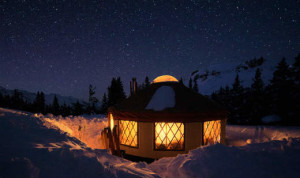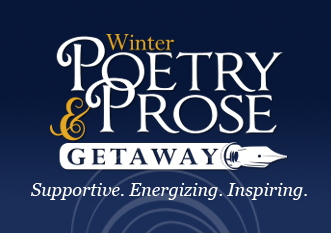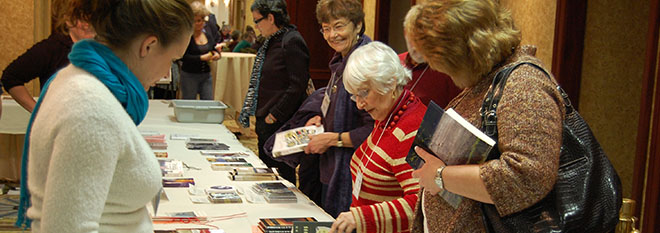Murphy Writing of Stockton University Presents

This entry is part of Getaway Reads, an e-mail series curated by Kendal Nicole Lambert that features the writing of the Winter Poetry & Prose Getaway faculty.
Excerpt from Chapter 1,
Pasture of Heaven
by Judith Lindbergh
The Kara Kam told my mother I would be important. I was five winters old and had just begun to learn the skill of sewing felt. I sat beside our fire working at two small patches with a thin wool thread when my mother stepped inside our winter hut, kneeling low to warm her hands.

“It is time,” she murmured, cupping her icy fingers around my elbow, looking across at my father who sat on a cushion with his long legs crossed. He’d been sharpening the edge of a new-made dagger. The tools of his craft lay scattered over the thick felt mat. “Blood moon.” My mother gestured toward a sudden light that had broken through the veil of snow falling lightly through our roof’s eye.
My father nodded, put down the blade, brushed away the bronze filings on his leather trousers. He rose, though he didn’t catch my mother’s eye. Not once. Both their gazes drifted upward toward the wafting flakes, laced with some foreboding I could not fathom.
I knew better than to question, as my mother stooped and found a spouted jug from the pile of our stores. It was her favorite—made of pounded silver deeply carved with warriors, horses and thick-maned lions of a style I had never seen, unlike anything my father or any other craftsman could have fashioned. It must have come from very far away for even the cut of the warriors’ clothes was different. Perhaps the jug was bargained for from a caravan of Persian merchants along the trade road—”Six sacks of colored ores I offer you!” “Add seven blocks of cheese!” “And three wool felts!” “No, I must have one of those fine daggers!”—I could almost hear the traders’ voices as my mother gestured to draw my attention back. She handed me the jug and helped me polish it with milk and sand, then gave me the small bronze bowl that always lay beside our fire. There our earthen cauldron steamed with fermented mare’s milk. It was another thing my mother had begun to show: how to make koumiss, the intoxicating drink whose bitter sips bring us closer to our ancestors.
I took up the bowl and ladled the koumiss carefully. When the jug was full, my mother nodded, then took them both and wrapped them tightly in soft leather bound with a thin gut cord. She stood me up and wrapped me also in a heavy, felt-sewn cloak. Outside, the snow was falling harder as my father brought our horses.
So late at night and all the other shelters of our camp already still—I sensed the burden of my parents’ silence as we rode into the storm. I fixed my gaze on our horses’ hoof-falls; they pricked the perfect blanket like small stitches through the white. We traveled eastward to where our narrow valley widened and windswept veils of forgotten spirits danced across a snow-draped steppe. There, beneath an overhanging cliff at the farthest boundary of the gorge, stood a single yurt—a low, round tent—not even a winter cabin.
I gaped at my mother, but she reached her hand. “Akmaral, a warrior is never frightened.” I nodded, clutched my cloak a little closer.
It was the Kara Kam’s yurt, as any child of our aul would know, swathed in felts so dark, they matched the high cliff’s walls. My mother had often told me how the Kara Kam could ride on the tails of golden eagles, how she knew the twisting fishes’ waters and could swim them out to the distant sea, that she flew between the altars of the stars and had traveled every passage to the heaven realm. But hers was a blackened path. She practiced in darkness, her yurt filled with acrid smoke, painted with ashes. So different from the Ak Kam, our people’s priestess, who sacrificed beneath the sky’s wide eye before the aul and all the elders where everyone could see and hear and understand her meaning.
My mother urged her horse and led us closer, settling our mounts where there stood a frail wood post. My father turned and raised his arms to ease me from my saddle. He clung to me, only for a moment until my mother tugged me off. I willed my eyes not to linger as I followed, trying hard not to stumble across the new, thick snow. Finally I entered behind my mother first and then my father.
They each knelt to give their offerings: a heavy sack of winter meat, small beads carved of colored stone, six pelts each of fox and marmot, a yearling sheep and my father’s new-honed blade with which to slaughter it. I carried the heavy jug filled with the drink my mother and I had prepared. And a tunic of colored felt, carefully embroidered, stretched across my mother’s arms. I’d seen her working at it, stitching in the dark, strange murmurs churning from her lips—prayers to our ancient ancestors.
The Kara Kam sat alone in her frigid hut. Her shoulders were slender, stooped beneath a rough silk tunic too large for her fragile frame. Her bare legs stuck out like brittle twigs from a long thick skirt of crimson wool. Around her waist she wore a woven belt tied with heavy tassels, and from her head rose a headdress as tall as the lattice walls, dangling with fine carved birds, gilded leaping horses, twisted lions attacking rams, and peaked with stilted arrows wrapped in strips of gold that spread like branches. They reached up as if to pierce the roof’s eye and join it with the sky. Before her lay powders of ochre, cinnabar, and ash, each pressed into oyster shells, though there was no ocean near here. Across her bare arms traced the tortured struggles of straining beasts—deer with griffins’ heads caught in the gripping jaws of winged snow leopards. They were etched into her skin as dark indigo tattoos.
I had never seen her properly before. The black kam always lived alone, following our paths, settling her yurt at the distant edge of our encampments. Only sometimes she’d appear in the shadows beyond our fires. All knew her for the sudden flash of her round bronze mirror. She would hold it in the dark to capture the hearth goddess Rada Mai’s homely light, and hurl the flare into a startling blaze that would tear the looming darkness. We all would scurry from it, frightened and blinded.
Now she held her mirror, bearing its shapes of five flying stags and a single mountain goat caught in an endless whirl, first upright to her face; then she turned and moved it through the air, softly, slowly, making the thin white smoke before her curl and dance. And she sang—strange, unintelligible chants—her mouth moving, showing livid gums, pegged teeth in purple lips sliding back and forth as she intoned them.
I squirmed to avoid her cutting light. But my father held me still as my mother bowed down graciously, offering her food. She unwrapped the jug and poured our koumiss into the small, bronze bowl. The Kara Kam paused, greeting her with a hard, quick glance, and then slowly a guileless, almost tearful smile. She took the bowl and dipped her fingers in, spreading the droplets several times in all directions. Finally she picked it up and loudly sipped, then gulped it down. My mother poured another bowl and passed it round for each of us to sip. Even me. I choked a bit before I swallowed.
At the black kam’s consent, my father pressed me forward. My mother took my wrapper off so that the air rushed around my body, icy, stabbing. Though the Kara Kam did not seem to feel it, her shoulders fully bare now as her eyes rolled back deep inside her skull. I willed myself not turn away as again she chanted, reaching blindly for a tall alabaster jug from which she sprinkled small black seeds over her smoldering fire.
Soon the yurt smelled strange. Another puff of smoke and then a haze. In time—I do not recall how long—the Kara Kam’s arms grew wide, then sprouted feathers. They rose up, flapped and she began to screech. She was a bird—a vulture circling, with wings all black and an ashen colored ruff. Then its stubbled head transformed again into the woman’s. I shuddered, for everything had turned odd before me, even my mother and my father who had somehow become long limbed gazelles.
I heard the Kara Kam speak to me clearly. “Look down at your feet, my sister’s daughter’s daughter.” I looked and saw a pair of hooves of the powerful steppe deer, then almost without thought, I leapt and flew across the open sky.
When I awoke, I was still shaking.
Somehow it was morning. The light shone bluish through the roof’s eye left open for the smoke that rose coldly from the black kam’s fire. She sat in silence, looking feeble and diminished. Her headdress was gone. Her eyes were pale and clouded. She seemed now truly blind as she grinned beyond me.
We left. My mother and my father both seemed pleased, bending to take my arms for I could barely stand or even hobble. But out of view of the old woman’s yurt, I began to feel my feet. They had left me, but now were firm and solid—leaden after so much flying.
“What do you remember, Akmaral?” my mother asked as we rode slowly back. When I told her, she nodded to my father. “I will make you the flying deer.”
Some weeks elapsed before a caravan stirred the traders’ road and we trotted close and, lowering our weapons so they knew we posed no threat, offered thick felted mats, raw wool and cheeses in exchange for unworked ore. In the passing time, my mother had carved a beeswax mold, her nimble fingers paring a graceful shape, then casting it in clay. Finally, she set it in the fire to burn away the dross, then poured the metal. When the mold was broken, she withdrew the perfect shape—the tiny, delicate antlers—threads made strong by the wisdom of a thousand generations.
When the little deer came to me, my mother strung it on a leather strand and hung it around my neck. I felt its heat. It was a long time cooling, and the fire left a little scar that I still treasure.
© Judith Lindbergh, 2015.
+ + + + + + + + + +
The Winter Poetry & Prose Getaway and Murphy Writing are programs of Stockton University.
+ + + + + + + + + +
Judith Lindbergh’s debut novel, The Thrall’s Tale, was a Booksense (IndieBound) Pick, a Borders Original Voices Selection and praised by Pulitzer Prize winners Geraldine Brooks and Robert Olen Butler. Her upcoming novel, Pasture of Heaven, is about a nomad woman warrior on the Central Asian steppes in the 5th century BCE. Her work has appeared in numerous publications including Archaeology Magazine, Scandinavian Review, The World & I, Tiferet, the literary journal Other Voices, and more. She contributed to the Smithsonian Institution’s exhibition Vikings: The Norse Atlantic Saga and was an expert commentator on the History Channel’s documentary series MANKIND: The Story of All of Us. Lindbergh is also the founder and director of The Writers Circle, which supports and develops creative writers and community in several locations in suburban New Jersey. To read some of her work, visit her website: www.judithlindbergh.com.
+ + + + + + + + + +
Want to study with Judith Lindbergh? Judith will lead the fiction portion of the Creative Writing Sampler Workshop at the 2016 Winter Poetry & Prose Getaway.
+ + + + + + + + + +
Our Participants Say It Best
“This was the best of the five Murphy Winter Getaways I’ve attended since 2010….I didn’t get away just to write. I got away to think. I got away to talk. I got away to think and talk about writing. I got some distance. I got some perspective. I got insight and information and encouragement. I got new ideas. I caught fire in unexpected ways.”
~ Jerri, Meyersdale, PA
Our Philosophy
Escape the distractions of your busy life. Advance your craft and energize your writing with a challenging and supportive Writing Getaway. Join us at one of our upcoming writing retreats and take advantage of plentiful writing time, insightful feedback, good meals and good company. Get Away to Write.
+ + + + + + + + + +






